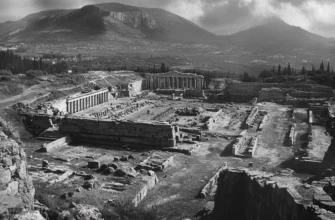The ancient Greek state system was based on democracy and popular self-government. In Athens, which was the center of Greek civilization, power belonged to the people, who gathered at general assemblies to decide important issues of state. In this system, legal norms and laws that regulated the lives of citizens were important. One of the most famous elements of ancient Greek democracy was the judiciary, which was exercised by citizens. Today, this state system is an important source of information for modern democracies and legal systems.
The organization of the state in Athens
The state in Athens was organized on the principles of democracy and popular self-government. Power belonged to the people, who gathered at a general assembly (ecclesia) to decide important state issues and elect officials. The state in Athens was divided into demes, which in turn consisted of triites. The demes and trihes were governed at the local level. The highest body of the state was the Great Assembly (ecclesia), which was convened regularly to discuss important issues. Military command was based on elections and was linked to the positions of military commanders.
Main features of Athenian law
The main features of Athenian law were that power belonged to the people, and legislation and justice were subject to the principles of justice and equality. In ancient Athens, there was public law that protected the rights and freedoms of citizens. Laws were written and common to all citizens, which ensured their equality before the law. Justice was administered by citizens elected by lot, so it was fairly objective. Citizens had the right to defend their interests in court proceedings and the right to appeal. In addition, Athens had a system of fines and penalties for breaking the law, which was also mandatory for all citizens.
The political system of ancient Athens
The political system of ancient Athens was based on the principles of democracy and self-government. Public life in Athens took place at general assemblies of the people (ecclesia), where citizens decided important issues of the state and elected officials. Power belonged to the people, who had the opportunity to make decisions on matters of war and peace, legislation, and finance. Alongside the ecclesia, Athens had a Council of Five Hundred, elected by lot, which consisted of representatives of the demes and prepared bills for the ecclesia. Political offices were temporary, limited in duration, and elected by lot. The demes and tripes were administered at the local level, while military command was associated with the offices of generals, who were elected by the people.
Legislation and justice in Athens
Legislation and justice in Athens were based on the principles of justice and equality. Laws were written and common to all citizens, which ensured their equality before the law. Important laws were the laws of Draco, Solon, and Cleisthenes, which established the limits of power and the rights of the people. Justice was administered by citizens elected by lot, so it was fairly objective. Citizens had the right to defend their interests in court proceedings and the right to appeal. In addition, Athens had a system of fines and penalties for breaking the law, which was also mandatory for all citizens. The laws in Athens were repeatedly revised and amended to achieve greater justice. In this way, legislation and justice in Athens ensured the protection of citizens’ rights and freedoms.
Rights and duties of citizens in Athens
In ancient Athens, the rights and duties of citizens were the basis of the functioning of the state. Citizens had the right to participate in decision-making at general assemblies (ecclesia), elect their representatives to the Council of Five Hundred, and participate in court proceedings. They also had the right to own and inherit property, the right to protect their interests from excessive power of state officials, and the right to express their views within the limits of the law.
However, citizens also had duties to the state, such as paying taxes, serving in the army, participating in the enforcement of court decisions, and implementing the general decisions of the ecclesia. They were also obliged to obey the laws that were common to all citizens.
Thus, the rights and duties of citizens in Athens were interrelated and ensured the functioning of the state on the principles of democracy and popular self-government.
The influence of Athenian law on modern democracies
Athenian law, which reflected the principles of democracy and equality before the law, has had a major influence on modern democracies. Many countries use the principles of Athenian law in their constitutions and legislation.
For example, the principles of “equality before the law” and “presumption of innocence” are standard principles of justice in most democratic countries. In addition, the ideas of civil rights and freedoms, electoral rights, the principle of separation of powers, and constitutional control also originate from Athenian law.
In particular, Ukraine, as a country with a democratic regime, reflects many principles of Athenian law in its Constitution, such as the power of the people, the right of citizens to participate in the government of the state, the protection of human and civil rights and freedoms, the independence of the judiciary, and others.
Thus, it can be said that Athenian law influences modern democracies, ensuring the development and functioning of the state on the principles of democracy, equality, justice, and the protection of human rights.
Conclusion
State system. Main features of Athenian law state system in the classical period was one of the first forms of direct democracy, where citizens participated directly in political life. The main authorities were the People’s Assembly, the Council of Five Hundred, and the jury courts, which were formed from ordinary citizens, ensuring broad participation in decision-making. Most positions were filled by lottery, which emphasized the principle of equality of all citizens before the law.
Athenian law was characterized by openness, accessibility, and a high level of citizen participation. Court proceedings were public, and decisions were made by a large number of jurors, which minimized the possibility of abuse. Citizens represented themselves in court, which required them to be legally knowledgeable and active. The principle of equality of citizens (isonomia) was the foundation of the legal system, although in practice it applied only to a limited group of people.
Despite its democratic foundations, the Athenian system had significant limitations. Women, metics, and slaves were deprived of political rights, which created deep social inequality. Thus, Athenian democracy combined progressive ideas of popular rule with restrictions on the rights of the majority of the population.
As a result, the state system and law of Athens became a unique historical phenomenon that had a significant impact on the further development of democratic traditions, the ideas of the rule of law, and the role of citizens in society.








